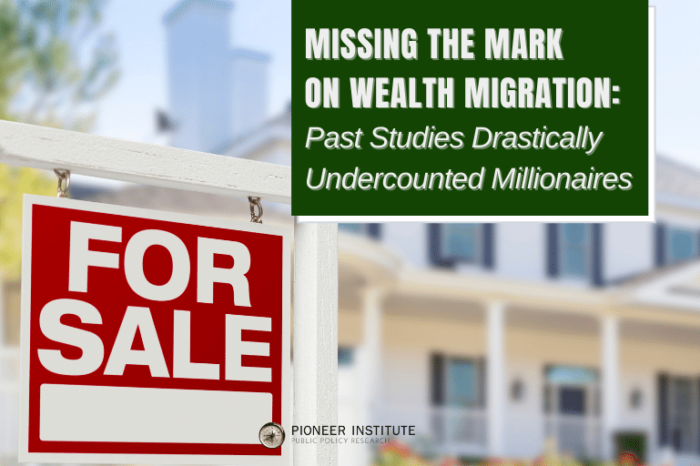Study: Graduated Income Tax Proponents Rely on Analyses That Exclude the Vast Majority Of “Millionaires” to Argue Their Case
Past Research Drastically Undercounts Households Subject to Surtax Proposal
BOSTON – Advocates for a state constitutional amendment that would apply a 4 percent surtax to households with annual earnings of more than $1 million rely heavily on the assumption that these proposed taxes will have little impact on the mobility of high earners. They cite analyses by Cornell University Associate Professor Cristobal Young, which exclude the vast majority of millionaires, according to a new study published by Pioneer Institute.
“Professor Young’s wealth migration analyses don’t capture the full breadth of tax flight by million-dollar earners,” said Andrew Mikula, co-author of “Missing the Mark on Wealth Migration: Past Studies Drastically Undercounted Millionaires.” “High-net worth households that do financial planning could move to another state before they sell million-dollar assets. They fly under the radar in Cristobal Young’s work because most of them don’t earn more than $1 million in the year before they leave.”
The graduated income tax proposal advanced by the Massachusetts Teachers Association, the Service Employees International Union, and other union, advocacy, and religious groups, defines earnings as including salary and capital gains on the sale of assets, which makes net worth a critical component of households subject to the tax.
The methodology of Professor Young, who has made a point of weighing in on the Massachusetts graduated income tax in Commonwealth magazine, suffers from three major flaws.
First, he only counts those who earned $1 million in the year before they moved. This approach ignores those who move in anticipation of earning a seven-figure annual income from selling high-value assets.
Second, he fails to consider the 850,000 U.S. households with net worth more than $10 million that earn less than $1 million annually. Three-fifths of households with more than $10 million in net worth had annual incomes of less than $1 million. Cumulatively, these households have trillions of dollars in unrealized capital gains that, if sold, may be subject to a graduated income tax such as is proposed in Massachusetts.
Third, Professor Young ignores the role of tax policy in attracting migrants to Florida, which does not have income, capital gains, or estate taxes. Instead, he treats Florida as a mere outlier, claiming that “when Florida is excluded, there is virtually no tax migration” in the United States.
“That’s akin to saying that if you exclude Muhammad Ali, Louisville, Kentucky hasn’t produced any great boxers,” said Greg Sullivan, who co-authored the Pioneer report with Mikula.
According to IRS data, Florida had a migration inflow of 122,341 returns from taxpayers with adjusted gross income (AGI) over $200,000 (the highest income category) from 2012 to 2018, with an average return of $647,305. Net of those who left the state, Florida’s inflow returns over the period totaled $62.6 billion in taxable income among the wealthy.
Looking at all returns, Massachusetts is a significant source of wealth migration to the Sunshine State. Massachusetts experienced a net outflow of $20.7 billion in AGI from 1993 to 2018, with nearly half of it going to Florida. Almost three quarters of the AGI outflow went to either Florida or New Hampshire, another no-income tax state.
Finally, Young concludes that 2.4 percent of millionaires move each year. Advocates are wrong — and policymakers would be irresponsible — to downplay that finding. Even without correcting for Young’s undercount of millionaire households, the cumulative effect of an annual loss of high-net-worth taxpayers can add up to big numbers over a decade or more, exacerbating the already considerable exodus of Massachusetts residents to Florida and other low-tax states.
During a constitutional convention this or next year, Massachusetts legislators will decide whether or not to advance the graduated income tax amendment to the statewide ballot in November 2022.
About the Authors
Gregory Sullivan is Pioneer’s Research Director. Prior to joining Pioneer, Sullivan served two five-year terms as Inspector General of the Commonwealth of Massachusetts and was a 17-year member of the Massachusetts House of Representatives. Greg is a Certified Fraud Investigator, and holds degrees from Harvard College, The Kennedy School of Public Administration, and the Sloan School at MIT.
Andrew Mikula is Economic Research Analyst at Pioneer Institute. Mr. Mikula was previously a Lovett & Ruth Peters Economic Opportunity Fellow at Pioneer Institute and studied economics at Bates College.
Pioneer’s mission is to develop and communicate dynamic ideas that advance prosperity and a vibrant civic life in Massachusetts and beyond.
Pioneer’s vision of success is a state and nation where our people can prosper and our society thrive because we enjoy world-class options in education, healthcare, transportation, and economic opportunity, and where our government is limited, accountable and transparent.
Pioneer values an America where our citizenry is well-educated and willing to test our beliefs based on facts and the free exchange of ideas, and committed to liberty, personal responsibility, and free enterprise.
Get Updates on Our Economic Opportunity Research
Related Posts:













